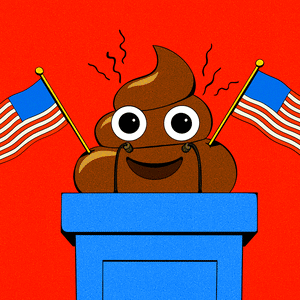There’s been a lot of chatter about how two very old men will be sufficiently jacked-up before Thursday’s presidential debate. But as an expert on debates—having successfully advised candidates including Scott Walker (in his recall election), Carly Fiorina (in her Senate race), and multiple British politicians on debate tricks and tactics—I’d like to suggest a different form of debate prep.
Both Donald Trump and Joe Biden should get a legitimately funny professional comedian in the room with them, and do it now.
While much debate prep focuses on ensuring a candidate can fluently discuss his or her policy—and a little bit on delivering zingers that take down the other guy—the moments that tend to stick in viewers’ memories for days, weeks, months, and years after a debate are the ones where someone made a great point by being, well, funny.
Anyone who watched 1984’s Ronald Reagan/Walter Mondale debate will remember Reagan’s rather funny line about not exploiting his opponent’s youth and inexperience for political purposes. That was great, not just because it countered a major knock on Reagan (his age), but because it made people laugh.
When people laugh along with a candidate, they tend to associate that experience with whatever or whoever provoked the emotion. It’s a positive thing.
Candidates, often being the major league dorks that they are, don’t always realize this. Their advisers, also being major league dorks, policy wonks, or ideologues, also often fail to realize it. And if they do get it, they worry about whether a candidate’s joke might be perceived as “inappropriate” or not befitting a future [insert prospective job title for the politician in question].
If, God forbid, the candidate accidentally makes a funny, the advisers shut it down, preferring the candidate sticks to talking points gleaned from a think tank’s policy white paper that they find fascinating.
But the rest of America does not.
This was an issue for Marco Rubio in 2016. I’ve spoken with Rubio advisers and big donors who honestly think that his “set to repeat” moment in the 2016 New Hampshire debate was better and more dignified for him than when he got into the back-and-forth about Donald Trump’s hands, as well as his ability to do yoga in other contexts, during the same cycle.
These people are wrong. Not only were those some of the only moments where Rubio got on the radar of a broad spectrum of voters the way a media-savvy, “can’t take your eyes off of him” Donald Trump has been doing since approximately age three—they actually made Rubio seem more normal and likable to people who don’t wear cashmere two-pieces with pearls to high dollar fundraisers. But those “regular folks” do, in fact, vote—especially if they feel someone interesting enough is on the ballot.
Trump also largely gets the utility of humor and—ironically for a guy who has an ego approximately the size of Jupiter—has leaned into self-deprecation over the course of his career.
The old clip of him motorboating Rudy Giuliani in drag is legitimately funny. Trump letting Jimmy Fallon mess up his hair was hilarious (also, extraordinarily useful for putting to bed notions that he just had to be wearing a wig). Trump’s 2016 Al Smith dinner joke, “I’m told Hillary went to confession before tonight’s event, but the priest was having a hard time, when he asked about her sins, and she said she couldn’t remember 39 times,” unsurprisingly pissed off Clinton fans. But it was actually funny.
Democrats recently went nuts over Trump citing the “late, great Hannibal Lecter,” and reciting the “I’m having an old friend for dinner” line. But a lot of people hear that line from the film and both wince and laugh at the same time—because phrases that have double meanings often do make us laugh.
The trouble with Trump is that as he’s become less accepted by Hollywood, the media—let’s say writ large the “cool kids” in America—he has developed a much bigger chip on his shoulder, and now inclines more towards “mean” than “funny.”
“Mean”—or perhaps rather “tough,” too, has its place in politics—especially when you’re trying to deliver a knockout blow to an opponent in a debate.
For this exact reason, while working as a communications consultant for former Texas Gov. Rick Perry’s 2012 presidential campaign, I once told senior staff that they should scupper all debate prep, and just put Perry on the phone with Rudy Giuliani and write down and memorize every mean, harsh thing Rudy could say about Mitt Romney. Then, I advised, Perry should repeat it all in the next debate. (Unfortunately, this advice was generally treated as a joke by fellow advisers, which it most definitely was not.)
It really is important that, wherever possible, you get in good digs at your opponent, ideally knocking them off balance and forcing them into errors they didn’t believe they could possibly make.
But humor still works better—even when it turns out that the thing you were joking about was no laughing matter.
Speaking of Romney, just ask him. Setting aside that he spent the whole of 2012 as the dorkier of the two candidates who legitimately did struggle to get laughs, I’m pretty sure neither he, nor we, nor Barack Obama, will now ever forget Obama’s line about Romney’s position on Russia, when he said “the 1980s are now calling to ask for their foreign policy back.” Great zinger.
Everyone laughed at the time, even those of us who absolutely agreed with Romney and disagreed with Obama. Of course, now it’s also memorable because even if Romney wasn’t funny, he was absolutely right.
But, ideally, to win a debate, a candidate should be both.
With all the double-hater voters out there, it would be smart of Trump and Biden to ensure they are seen as at least one of these things—and for most Americans, funny is probably less of a stretch goal than correct.








